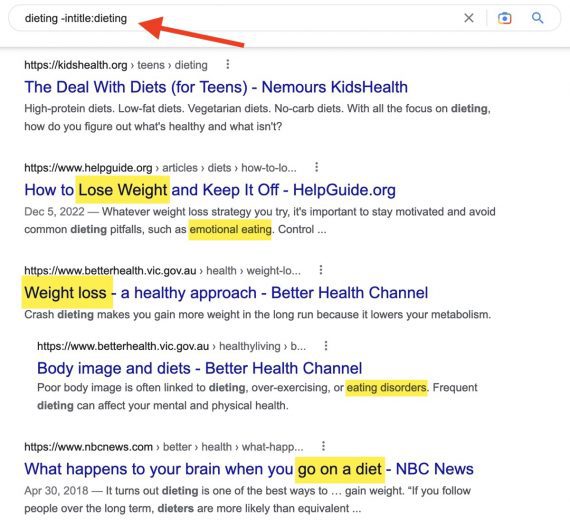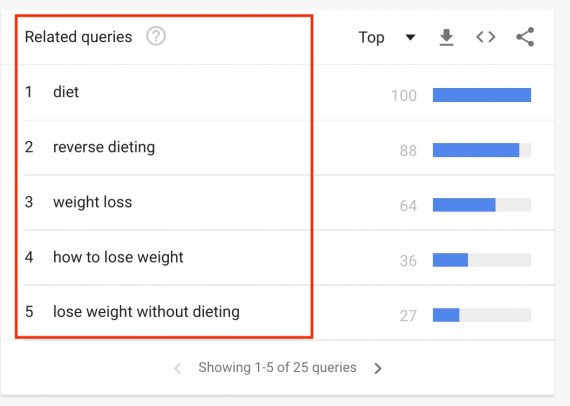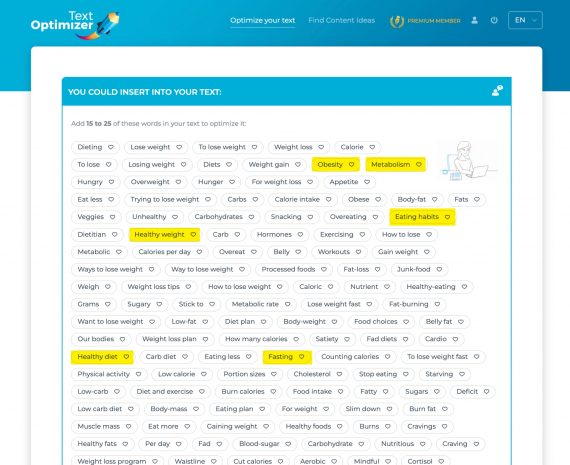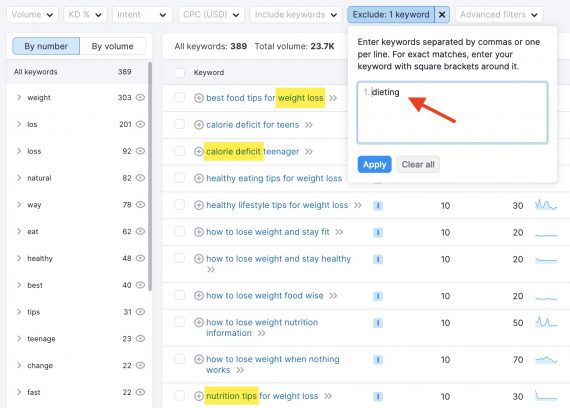Keyword research for search engine optimization involves expanding a core word or phrase with so-called modifiers, words that imply query intent.
For example, modifiers for the core term of “dieting” could include “dieting tips,” “dieting apps,” and “dieting for dummies.” All signal unique needs and phases of buying journeys.
But how to find those modifiers, the related terms? I’ll address it in this post.
How to Find Related Keywords
Google. When it comes to keyword research, Google is your (free) best friend. Google search results include keywords closely related to a query. An -intitle: search operator will produce results that exclude the query term in the title tags. It’s an excellent way to identify modifiers and other content ideas.

An -intitle: search operator will produce results that exclude the query term in the title tags, such as this example for “dieting.” Click image to enlarge.
The “People also ask” section of search results can also reveal related terms, as can Google Trends with its “Related queries” list. “Related” in this case is what folks search for after the core (or “seed”) keyword.

Google Trends’ “Related queries” shows the terms folks search for after the core keyword. Click image to enlarge.
Text Optimizer. Semantic analysis is the process of expanding a topic into related concepts and entities. It provides a better understanding of the context behind any query.
Google uses semantic analysis to generate search results based on the meaning of a query instead of the exact phrase. Thus a query of “dieting” could include results for “lose weight.”
Search optimizers use semantic research for a better understanding of a keyword.
Text Optimizer can help by generating the related phrases from Google search results for a given query. It’s a handy way to discover modifiers to expand the seed terms in product descriptions, blog posts, titles, and related. The company offers a WordPress plugin and a Chrome extension in addition to its website.

Text Optimizer can generate related phrases in Google search results for a given query, such as “dieting” in this example. Click image to enlarge.
Semrush. Semrush offers “related” keywords — “variants, synonyms, or semantically related terms” — to any seed. Enter the term and then filter it from the ensuing results to obtain only modifiers.
Semrush obtains “related keywords” from Google’s top 20 organic results based on overlapping phrases with the seed — the more frequent the overlap, the more related.
For example, the core term of “dieting” overlaps with “weight loss,” “calorie deficit,” and “nutrition tips.”
Semrush also shows, on the left (below), search trends around the related keywords. For “dieting,” the trends include “natural,” “teenage,” and “change.” Clicking any of them generates yet another list of related keywords from that trending term.
Check the search volume and ranking difficulty of every related keyword. Then target those terms by publishing new pages or altering existing ones.

The core term of “dieting” overlaps with “weight loss,” “calorie deficit,” and “nutrition tips.” Click image to enlarge.
Never-ending
Keyword research is a never-ending process of discovering a target audience’s search terms and patterns. The research is not restricted to Google. YouTube, Amazon, and, yes, Bing can help, too.





